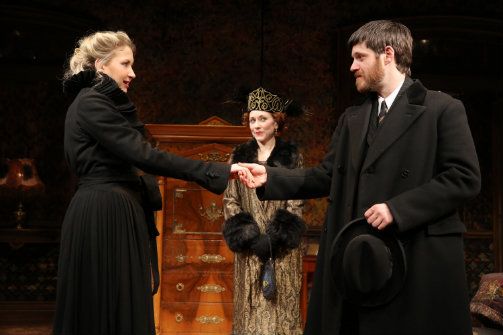
Tales From Red Vienna
By David Grimm; Directed by Kate Whoriskey
Produced by Manhattan Theatre Club
Off Broadway, New Play
Through 4.27.14
Stage I at City Center, 131 West 55th Street
by Weston Clay on 3.18.14
 Nina Arianda, Tina Benko and Michael Esper in Tales From Red Vienna. Photo by Joan Marcus.
Nina Arianda, Tina Benko and Michael Esper in Tales From Red Vienna. Photo by Joan Marcus.
BOTTOM LINE: Nina Arianda! Nina Arianda! Nina Arianda!
It’s no secret that Nina Arianda is an it-girl of New York Theater. Her most recent performance, in Broadways’ Venus in Fur, nabbed her a Tony award, and her previous performance, in Broadway’s Born Yesterday, got her a nomination. What is a bit shocking is that those were the only two professional shows she’s ever been in (Venus in Fur was originally an off Broadway production at the Classic Stage Company). In a city full of actors clawing their way through endless auditions in hopes of getting some fame and recognition, Arianda’s career appears rather clean and effortless. But don't be mad at her, actors of New York, because she absolutely deserves it.
That Nina Arianda is one of the most talented stage performers of our time has never been more evident than in her current role as Heléna in Manhattan Theatre Club’s production of David Grimm’s Tales From Red Vienna.
When we meet Heléna, she’s in a bad situation. Her husband has died in World War I, leaving her in a desperate financial struggle. She’s given up her extravagant house for a small apartment -- but, lucky for us, she’s kept her maid, Edda, played by marvelous Kathleen Chalfant -- and to make things worse, she fears the judgment of her friends who don’t understand (or really even believe in) money problems. To make ends meet, Heléna has reluctantly turned to prostitution, which magnifies these fears to an almost unbearable extent.
As the plot proceeds, Heléna finds herself on the verge of discovery when a man that her fiend Mutzi (Tina Benko) sets her up with turns out to be one of her johns. Mutzi is rich, charming, and entirely not compassionate; she would undoubtedly ruin Heléna’s social standing should she discover her secret.
I’m lucky enough to have seen Arianda in both Venus in Fur and Born Yesterday and I’d venture to say that this is her best performance yet. As a character, Heléna is incredibly complex as she tries to juggle her social status, finances, friendships, new love and, most importantly, her own happiness with grace and integrity but finds herself tangled in more and more unsolvable problems. Arianda’s Heléna is admirable and sympathetic and smart, but also deeply human, and I wanted nothing more for her than the one thing that society and life just won't let her have: happiness.
The rest of the cast compliments Arianda beautifully. Chalfant as Edda is deadpan hilarious and provides an often welcome comic relief without compromising the overall mood of the show. The same can be said for Benko, who strikes a delightful note with Mutzi, managing to avoid over-acting with an over-the-top character which, in this case, is a crucial distinction: much of her personality is an act to cover up her nasty disloyalty which could easily be lost in a miss-the-mark performance. Michael Esper as Béla Hoyos, Heléna’s client-come-suitor, and Michael Goldsmith as Rudy, the grocer’s sun who adores Heléna, are also both fantastic. There is no weak link in this cast.
The language in this play seems, at times, rather modern. I found myself wondering if people in 1920 would actually say some of the things that these people said. At the same time, though, there’s almost a lack of vernacular to the way these characters speak which, in the end, makes the language seem more timeless than time-specific. They also speak without accents (remember, this is set in Austria), adding to this sense of linguistic neutrality. Combine this with crystal-clear delivery from the cast, and you never miss even a word of the script. In effect, every moment is important and the 2-plus hours are at no point bogged down by anything remotely boring or confusing. Director Kate Whoriskey knows exactly what she’s doing.
The only drawback to this production comes in the design. John Lee Beatty’s set is, for the most part, very realistic, but also has elements of artistic flair that call a little too much attention to themselves. The wallpaper in Heléna’s apartment is confusingly splashed with bright colors and there’s a conspicuous gash down the center of the wall (which proves itself functional in the dramatic scene change but, in the context of such a realistic on-stage world, is a glaring incongruity).
The same can’t be said for Anita Yavich’s costumes, which are period-perfect and work to develop each character on a visual level. Mutzi’s extravagant hats and modern dresses, for example, make it immediately clear the kind of woman she is.
There are many good reasons to see the show, but what really seals it is the opportunity to see Nina Arianda in a relatively small theater. At curtain call, her eyes were red and a bit puffy and her hair was all mussed up. The emotions that she manifested for her character had all the same physiological effects as is they were real -- as if she, for those two hours, really was Heléna. If that isn’t transcendent acting, I don’t know what is. If that isn’t acting perfected, I don’t believe it exists.
(Tales From Red Vienna plays at Manhattan Theatre Club Stage I at New York City Center, 131 West 55th Street, through April 27, 2014. Performances are Tuesdays at 7PM; Wednesdays at 2PM and 7PM (except 3/19, no 2PM show; 3/26 at 2PM and 8PM; and 4/2 at 1PM and 7PM); Thursdays and Fridays at 8PM; Saturdays at 2PM and 8PM; and Sundays at 2PM (except 3/23 at 2PM and 7PM). Tickets are $89 and are available at nycitycenter.org or by calling 212.581.1212. For more information, visit manhattantheatreclub.com.)

